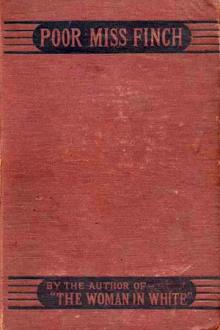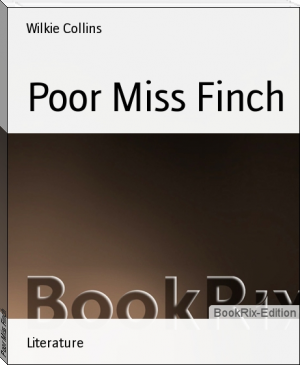Poor Miss Finch - Wilkie Collins (best books to read for beginners txt) 📗

- Author: Wilkie Collins
- Performer: -
Book online «Poor Miss Finch - Wilkie Collins (best books to read for beginners txt) 📗». Author Wilkie Collins
First, a Mayonnaise of chicken of my own making on the luncheon-table, which, as a work of Art, was simply adorable—I say no more. Secondly, my green silk dress, trimmed with my mother’s famous lace—another work of Art, equally adorable with the first. Whether I looked at the luncheon-table, or whether I looked in the glass, I could feel that I worthily asserted my nation; I could say to myself, Even in this remote corner of the earth, the pilgrim of civilization searching for the elegant luxuries of life, looks and sees—France supreme!
The clock chimed the quarter past three. Lucilla, wearying, for the hundredth time of waiting in her own room, put her head in at the door, and still repeated the never-changing question—“No signs of them yet?”
“None, my love.”
“Oh, how much longer will they keep us waiting!”
“Patience, Lucilla—patience!”
She disappeared again, with a weary sigh. Five minutes more passed; and old Zillah peeped into the room next.
“Here they are, ma’am, in a chaise at the gate!”
I shook out the skirts of my green silk, I cast a last inspiriting glance at the Mayonnaise. Nugent’s cheerful voice reached me from the garden, conducting the strangers. “This way, gentlemen—follow me.” A pause. Steps outside. The door opened. Nugent brought them in.
Herr Grosse, from America. Mr. Sebright of London.
The German gave a little start when my name was mentioned. The Englishman remained perfectly unaffected by it. Herr Grosse had heard of my glorious Pratolungo. Mr. Sebright was barbarously ignorant of his existence. I shall describe Herr Grosse first, and shall take the greatest pains with him.
A squat, broad, sturdy body, waddling on a pair of short bandy legs; slovenly, shabby, unbrushed clothes; a big square bilious-yellow face, surmounted by a mop of thick iron-grey hair; dark beetle-brows; a pair of staring, fierce, black, goggle eyes, with huge circular spectacles standing up like fortifications in front of them; a shaggy beard and mustache of mixed black, white, and grey; a prodigious cameo ring on the forefinger of one hairy hand; the other hand always in and out of a deep silver snuff-box like a small tea-caddy; a rough rasping voice; a diabolically humourous smile; a curtly confident way of speaking; resolution, independence, power, expressed all over him from head to foot—there is the portrait of the man who held in his hands (if Nugent was to be trusted) the restoration of Lucilla’s sight!
The English oculist was as unlike his German colleague as it is possible for one human being to be to another.
Mr. Sebright was slim and spare, and scrupulously (painfully) clean and neat. His smooth light hair was carefully parted; his well-shaved face exhibited two little crisp morsels of whisker about two inches long, and no hair more. His decent black clothes were perfectly made; he wore no ornaments, not even a watch-chain; he moved deliberately, he spoke gravely and quietly; disciplined attention looked coldly at you out of his light grey eyes; and said, Here I am if you want me, in every movement of his thin finely-cut lips. A thoroughly capable man, beyond all doubt—but defend me from accidentally sitting next to him at dinner, or traveling with him for my only companion on a long journey!
I received these distinguished persons with my best grace. Herr Grosse complimented me in return on my illustrious name, and shook hands. Mr. Sebright said it was a beautiful day, and bowed. The German, the moment he was at liberty to look about him, looked at the luncheon-table. The Englishman looked out of window.
“Will you take some refreshment, gentlemen?”
Herr Grosse nodded his shock head in high approval. His wild eyes glared greedily at the Mayonnaise through his prodigious spectacles. “Aha! I like that,” said the illustrious surgeon, pointing at the dish with his ringed forefinger. “You know how to make him—you make him with creams. Is he chickens or lobsters? I like lobsters best, but chickens is goot too. The garnish is lofely—anchovy, olive, beetroots; brown, green, red, on a fat white sauce! This I call a heavenly dish. He is nice-cool in two different ways; nice-cool, to the eye, nice-cool to the taste! Soh! we will break into his inside. Madame Pratolungo, you shall begin. Here goes for the liver-wings!”
In this extraordinary English—turning words in the singular into words in the plural, and banishing from the British vocabulary the copulative conjunction “and”—Herr Grosse announced his readiness to sit down to lunch. He was politely recalled from the Mayonnaise to the patient by his discreet English colleague.
“I beg your pardon,” said Mr. Sebright. Would it not be advisable to see the young lady, before we do anything else? I am obliged to return to London by the next train.”
Herr Grosse-with a fork in one hand and a spoon in the other, and a napkin tied round his neck—stared piteously; shook his shock head; and turned his back on the Mayonnaise, with a heavy heart at parting.
“Goot. We shall do our works first: then eat our lunches afterwards. Where is the patients? Come-begin-begin!” He removed the napkin, blew a sigh (there is no other way of expressing it)—and plunged his finger and thumb into his tea-caddy snuff-box. “Where is the patients?” he repeated irritably. “Why is she not close-handy in here?”
“She is waiting in the next room,” I said. “I will bring her in directly. You will make allowances for her, gentlemen, I am sure, if you find her a little nervous?” I added, looking at both the oculists. Silent Mr. Sebright bowed. Herr Grosse grinned diabolically, and said, “Make your mind easy, my goot creature. I am not such a brutes as I look!”
“Where is Oscar?” asked Nugent, as I passed him on my way to Lucilla’s room.
“After altering his mind a dozen times at least,” I replied, “he has decided on not being present at the examination.”
I had barely said the words before the door opened, and Oscar entered the room. He had altered his mind for the thirteenth time—and here he was as the result of it!
Herr Grosse burst out with an exclamation in his own language, at the sight of Oscar’s face. “Ach, Gott!” he exclaimed, “he has been taking Nitrates of Silvers. His complexions is spoilt. Poor boys! poor boys!” He shook his shaggy head—turned—and spat compassionately into a corner of the room. Oscar looked offended; Mr. Sebright looked disgusted; Nugent thoroughly enjoyed it. I left the room and closed the door behind me.
I had not taken two steps in the corridor when I heard the door opened again. Looking back directly, I found myself, to my amazement, face to face with Herr Grosse—staring ferociously at me through his spectacles, and offering me his arm!
“Hosh!” said the famous oculist in a heavy whisper. “Say nothing to nobody. I am come to help you.”
“To help me?” I repeated.
Herr Grosse nodded vehemently—so vehemently that his prodigious spectacles hopped up and down on his nose.
“What did you tell me just now?” he asked. “You told me the patient was nervous. Goot! I am come to go with you to the patients, and help you to fetch her. Soh! soh! I am not such a brutes as I look. Come-begin-begin! Where is she?”
I hesitated for a moment about introducing this remarkable ambassador into Lucilla’s bedroom. One look at him decided me. After all, he was a doctor,—and such an ugly one! I took his arm.
We went together into Lucilla’s room. She started up from the sofa on which she was reclining when she heard the strange footsteps entering, side by side with mine.
“Who is it?” she cried.
“It is me, my dears,” said Herr Grosse. “Ach, Gott! what a pretty girls! Here is jost the complexions I like-nice-fair! nice-fair! I am come to see what I can do, my pretty Miss, for this eyes of yours. If I can let the light in on you—hey! you will lofe me, won’t you? You will kees even an ugly Germans like me. Soh! Come under my arm. We will go back into the odder rooms. There is anodder one waiting to let the light in too—Mr. Sebrights. Two surgeon-optic to one pretty Miss—English surgeon-optic; German surgeon-optic—hey! between us we shall cure this nice girls. Madame Pratolungo, here is my odder arms at your service. Hey! what? You look at my coatsleeve. He is shabby-greasy—I am ashamed of him. No matter. You have got Mr. Sebrights to look at in the odder rooms. He is spick-span, beautiful-new. Come! Forwards! Marsch!”
Nugent, waiting in the corridor, threw the door open for us. “Isn’t he delightful?” Nugent whispered behind me, pointing to his friend. Escorted by Herr Grosse, we made a magnificent entry into the room. Our German doctor had done Lucilla good already. The examination was relieved of all its embarrassments and its terrors at the outset. Herr Grosse had made her laugh—Herr Grosse had set her completely at her ease.
Mr. Sebright and Oscar were talking together in a perfectly friendly way when we returned to the sitting-room. The reserved Englishman appeared to have his attraction for the shy Oscar. Even Mr. Sebright was struck by Lucilla; his cold face lit up with interest when he was presented to her. He placed a chair for her in front of the window. There was a warmth in his tone which I had not heard yet, when he begged her to be seated in that place. She took the chair. Mr. Sebright thereupon drew back, and bowed to Herr Grosse, with a courteous wave of his hand towards Lucilla which signified, “You first!”
Herr Grosse met this advance with a counter-wave of the hand, and a vehement shake of his shock-head, which signified, “I couldn’t think of such a thing!”
“Pardon me,” entreated Mr. Sebright. “As my senior, as a visitor to England, as a master in our art.”
Herr Grosse responded by regaling himself with three pinches of snuff in rapid succession—a pinch as senior, a pinch as visitor to England, a pinch as master in the art. An awful pause followed. Neither of the surgeons would take precedence of the other. Nugent interfered.
“Miss Finch is waiting,” he said. “Come, Grosse, you were first presented to her. You examine her first.”
Herr Grosse took Nugent’s ear between his finger and thumb, and gave it a good-humoured pinch. “You clever boys!” he said. “You have the right word always at the tips of your tongue.” He waddled to Lucilla’s chair; and stopped short with a scandalized look. Oscar was bending over her, and whispering to her with her hand in his. “Hey! what?” cried Herr Grosse. “Is this a third surgeon-optic? What, sir! you treat young Miss’s eyes by taking hold of young Miss’s hand? You are a Quack. Get out!” Oscar withdrew—not very graciously. Herr Grosse took a chair in front of Lucilla, and removed his spectacles. As a short-sighted man, he had necessarily





Comments (0)